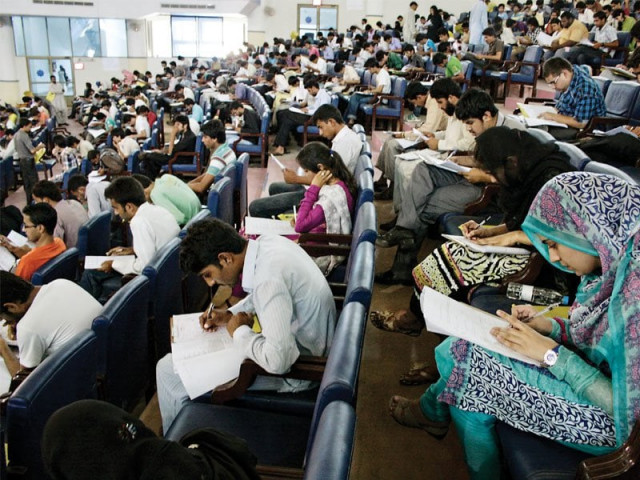Medical tests: NTS lands in hot water again as allegations emerge
CM constitutes committee to investigate claims of improper conduct during tests

CM constitutes committee to investigate claims of improper conduct during tests. PHOTO: SHAFIQ MALIK/ EXPRESS
The committee comprises Aijaz Ahmed Mahesar, the special secretary of the health department as the chairperson as well as Health Director-General Mohammad Akhlaq, Government General Hospital Lyari Medical Superintendent Dr Khalil Ahmed Pathan, Health Additional Director Mohsin Shaikh and Nadeem Akhtar Shaikh, who will work as convener.
The committee will work to ascertain the veracity of the allegations appearing in print and social media that claim the paper and answer key were leaked and provided to some candidates prior to test on receiving illegal gratification. It will also investigate the process of the entry test conducted through the NTS for admissions in public sector medical colleges and universities in the province. It will also record and investigate statements of stakeholders in the case, including the students and parents.
The committee has been directed to submit its findings, along with recommendations, within 10 days. The committee has also been allowed to co-opt any member for their assistance.
The issue of the irregularities and hefty fee levied by the NTS is not new. The Higher Education Commission (HEC) announced in July its intention to conduct entrance tests via the Education Testing Council (ETC), leaving many students confused as to which test they should prepare for. The ETC is conducted free of charge. However, the HEC's Sindh chapter has not been receptive to the move and has renewed its tussle with the federal HEC, dating back to the establishment of the former in 2013.
In the recent disagreement, the provincial HEC sent a letter to its federal counterpart and senior heads of the bureaucracy in Sindh in September about the entry tests being conducted by the ETC.
The HEC had announced the formation of ETC last year, and this year the council has conducted tests of around 66,000 students in 28 cities for about 54 public and private-sector universities.
The HEC made the decision after it failed to justify in the Lahore High Court that holding the 'mandatory' tests under the NTS was formally approved by its governing body. The court also ordered the HEC to constitute its own testing service and termed the NTS an illegal body for conducting tests.
The provincial education commission deputy director claimed, in a letter to the federal agency, that it had invited students to participate in entry tests for universities in Sindh without consulting them. "The advertisement was issued without consulting the Council of Common Interests and the Sindh HEC," the letter read, calling the advertisement 'coram non judice' and "not in conformity with the cannons of justice and fair play".
The letter was a serious blow to the HEC, which is hoping to make it mandatory for all public universities to carry out tests under the ETC from spring 2018 onwards.
HEC Chairperson Mukhtar Ahmed had told The Express Tribune that the ETC was protected under the law and Supreme Court's 2011 order where it was said that the HEC will function until an amendment is proposed in the HEC ordinance.
In March this year, the Auditor General of Pakistan (AGP) found several discrepancies in its special audit of the NTS, however the latter's official denied most of the findings.
The special audit revealed that the NTS was functioning without rules, policies, corporate strategy and organised objectives that caused misuse of funds, misappropriation of billions of rupees and even raised questions over its legality.
The audit was requested by the COMSATS Institute of Information Technology's board of governors through the HEC in October 2016. It was the first audit of the NTS by the AGP since its inception in 2003, while the one by the Securities and Exchange Commission of Pakistan was rejected outright by the NTS on technical grounds.
In September, Chief Justice of Pakistan Mian Saqib Nisar sought a report from the authorities on whether the government directives for a 50% cut in the fee levied on applicants for government jobs appearing before the NTS were being complied with. A university student had filed an application with the top court, submitting that for each job vacancy, candidates have to pay a hefty fee which an unemployed person could not afford.
Published in The Express Tribune, October 28th, 2017.



















COMMENTS
Comments are moderated and generally will be posted if they are on-topic and not abusive.
For more information, please see our Comments FAQ